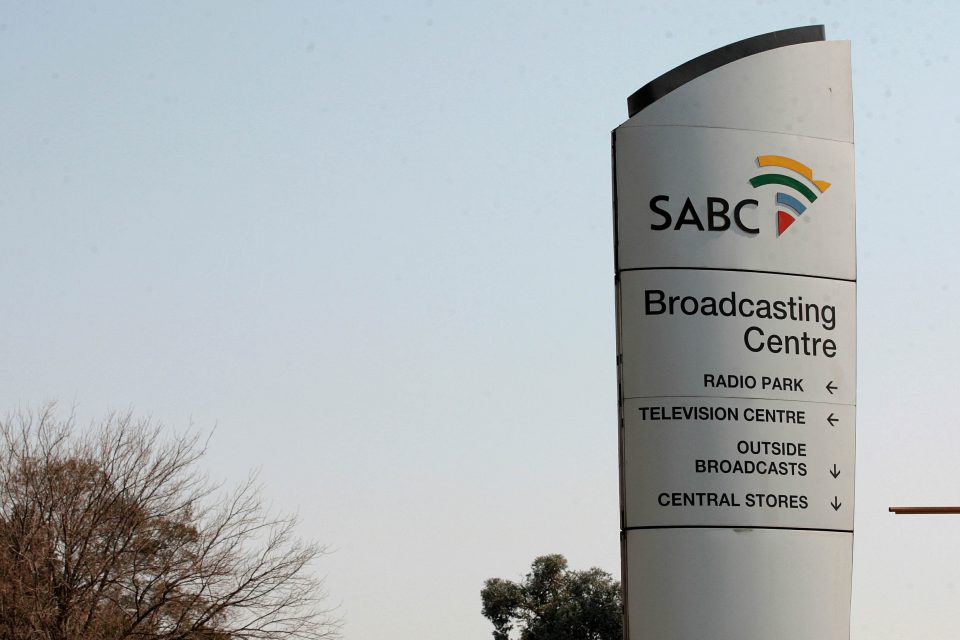The dying SABC is crippling South African sport
The abysmal state of the public broadcaster is not only devastating for its thousands of staff. It could destroy sport in this country.
Author:
19 August 2019

The slow and painful death of the South African Broadcasting Corporation (SABC) will ultimately bring sport to its knees in this country. A technical glitch on Saturday afternoon during Cape Town City’s clash with Polokwane City in the MTN8 showed glimpses of that bleak future.
A few minutes into the game, football supporters were left in the dark. This is slowly becoming an all-too-familiar experience for millions of South Africans who have been hit with a radio and television blackout after the SABC failed to reach an agreement with MultiChoice on the purchase of Premier Soccer League (PSL) broadcasting rights. MultiChoice customers were given a taste of what their fellow citizens, who rely on the public broadcaster, are going through when SuperSport lost its feed to the match in the Mother City.
If anything showed the dangers of a monopoly, it was this. SuperSport calmly carried on as if nothing was amiss while Rise and Shine took the lead with a goal that was only seen by the fans at Newlands Stadium. The studio panel analysed a match they also weren’t able to watch before eventually giving up on the ridiculous exercise. They then aired the launch of the MTN8, forcing the fans to camp on social media for updates. Broadcast resumed three minutes into the second half.
Without a hint of irony, SuperSport aired an advert during the blackout that touted the new innovation in this year’s MTN8, which allows fans to vote for the Man of the Match. Of course, for fans to do this, they’ll have to watch the game – which wasn’t possible for most of the opening match of one of the most lucrative domestic cup competitions on the continent.
A public broadcaster on life support
The SABC isn’t dead just yet, but it’s on life support with both domestic and English Premier League football the latest addition to the sports it doesn’t broadcast. The cash-strapped public broadcaster announced that the pay-TV giant wanted them to pay R1.4 billion for five years for the rights for which MultiChoice is reported to have paid just over R2 billion. Neither the PSL nor MultiChoice have ever officially announced the exact amount the pay-TV channel paid last year for the purchase of broadcasting rights for the five-year cycle that starts this season.
“The SABC was expected to pay SuperSport R280 million for 144 matches per year for a period of five years, and during that period, the SABC would have made revenue of only R9.8 million per year,” the public broadcaster said in a statement it released on the eve of the start of the 2019-2020 season.
Most of the 144 matches would have been scraps in the Absa Premiership with MultiChoice exclusively showing the most high-profile games. It’s only the cup competitions and the Soweto Derby, the biggest sporting event in South Africa, that the public broadcaster would have been guaranteed to show in the array of the most sought-after matches.
Related article:
“This would not have been a commercially viable agreement for the SABC. Over the last five years, the public broadcaster has incurred a loss of R1.3 billion in relation to the broadcast of PSL matches and a decision has been taken that any agreement entered into should be financially sound and sustainable for the business, ensuring that there is return on investment for the organisation,” the statement by the SABC continued.
The PSL ended their own statement on the SABC blackout with an ominous paragraph after revealing that its chairperson, Irvin Khoza, had immediately written to the Minister of Communications and Digital Technologies, Stella Ndabeni-Abrahams, and the Minister of Sports, Arts and Culture, Nathi Mthethwa, upon realising that millions of South Africans would be unable to watch the matches.
“In addressing this matter, it is maybe time that the nation accept that the SABC is incapable of meeting its requirements since a ‘blackout’ to the majority who consume their football through free-to-air television and radio is unacceptable going forward,” the PSL said.
The SABC and the South African Football Association (Safa) are still at loggerheads when it comes to a renewal of their broadcasting agreement. The public broadcaster offered to pay R10 million instead of the at least R110 million Safa wants as per the previous agreement. This left most South Africans unable to watch Bafana Bafana against Nigeria and Seychelles at FNB Stadium in the qualifiers of the 2019 Africa Cup of Nations.
No money for mandate
Banyana Banyana’s first appearance in the Fifa Women’s World Cup was also not shown by the public broadcaster just as the bulk of the Cricket World Cup wasn’t. It’s now normal that domestic cricket and rugby aren’t on free-to-air TV, with SABC only showing the Proteas and Springboks in action when they are playing at home. The Boks’ games are delayed transmissions, shown only after the match has finished.
The former SABC chief operating officer Chris Maroleng bemoaned what he calls an “unfunded mandate”, which demands that the public broadcaster shows games of national importance. It costs money to do so, money the SABC doesn’t have. More games could be deemed of national importance, which would just add to the load shouldered by the beleaguered public broadcaster, should the Independent Communications Authority of South Africa (Icasa) pass its proposed broadcasting rights amendments.
“We are mandated, in terms of our regulations, to carry 22 sporting codes as stipulated in the Icasa regulations. But there is no explanation of where the SABC should find the commercial windfall to fund this R1.2 billion,” Maroleng said after the Bafana blackout.
The SABC is in this position chiefly because of financial mismanagement from political appointees who have brought the broadcaster to its knees. For the umpteenth time, the organisation is asking Treasury for billions for a bailout.
While it has been floundering and then going to the government, cap in hand, to ask for rescue, broadcasting rights have become exponentially expensive. The financial muscle of MultiChoice means that no one can compete with it in South Africa. Other pay-TV channels have unsuccessfully tried to challenge its monopoly but failed because the organisation practically owns South African sport. The financial investments MultiChoice have made to acquire broadcasting rights have drastically improved those sports with money pouring into infrastructure and better salaries for the players.
Between accessibility and making money
But MultiChoice’s corporate monopoly is unhealthy. Sport in this country needs a strong SABC with a clear public mandate for it to grow. In an earlier interview with New Frame, the regional managing director of Nielsen Sport for Africa and the Middle East, Kelvin Watt, explained why Absa pulled out of sponsoring the Currie Cup to focus on domestic football.
“The small reach cricket and rugby have in terms of viewers has an impact on the sponsors they attract and how they sell themselves,” Watt said. “Absa, for instance, pulled out of sponsoring the Currie Cup because it wanted to reach a wider audience to build its base. It achieved that through football and its sponsorship of the Absa Premiership. There are roughly eight to nine million people who watch the Springboks. There are around 15 million people who watch the Proteas, and there are more than 30 million people who watch the PSL.”
Related article:
Rugby and cricket being available only to the elite has the effect of detaching South Africans from their domestic leagues. You’d be hard pressed to find South Africans, even those with premium subscriptions, who can name five cricket franchise players who haven’t been in the Proteas lineup. Domestic cricket is practically dead because of this isolation. As it is only watched by a handful of people, Cricket South Africa (CSA) struggles to get and keep sponsors. Domestic football doesn’t have such problems because of its wide reach, which is largely thanks to the SABC. Take this away and you are flirting with danger.
The buzz of the Mzansi Super League (MSL) was largely due to the tournament being shown by the public broadcaster after MultiChoice pulled out. Proteas batsman Rassie van der Dussen excitedly spoke about how good he felt on hearing petrol attendants talking about domestic cricket, something that didn’t happen when the sport was fenced off in a package that costs almost R1 000 a month. But CSA didn’t make money from broadcasting the matches, even though its product reached more households. The challenge for South African sports at the moment is that it needs MultiChoice’s money and SABC’s reach – finding a balance is critical for its survival.
What needs to happen
This is where Icasa and government come in. The SABC has called for more transparency in the bidding process, arguing that it has been made to pay for rights without knowing how much was originally charged for them. The public broadcaster has also called for the unbundling of the rights, describing it as ludicrous that MultiChoice, which doesn’t have a radio station, can buy radio rights that it can then sell to the SABC, which has no choice but to pay whatever the rights holder wants.
Icasa needs to tighten the current regulations, and to do so in the interests of a democratic public sphere rather than corporate profit making, before it even thinks about adding more load to an SABC that’s already struggling with its current obligations. The government, which is also responsible for transforming the sporting landscape, has to support SABC financially because children from poor households who are passionate about rugby and cricket can’t access the content otherwise. They aren’t able to see the heroes who can inspire them.
But the government shouldn’t just throw money at the SABC. The right people need to be appointed and be held accountable when they don’t meet the requirements.
If MultiChoice ends up being the only broadcast player in the country’s sporting landscape, it can hold the sporting bodies and the public to ransom because sport won’t have an alternative for money and, more importantly, for airing events. The MSL was most affected by this stranglehold, with allegations that SuperSport tried to put pressure on broadcasting freelancers by threatening to end its relationship with them if they worked with the SABC on the tournament after refusing to broadcast it. If there is only one broadcaster, it will operate as it pleases because the fans and those running sports in the country will have no alternative but to use it.


